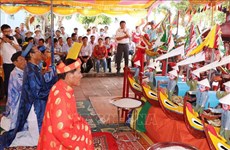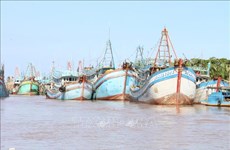Safe food chains established in HCM City
After three years co-operating with companies to develop safe food
chains for essential items, the municipal Health Department has
succeeded in establishing three – for eggs, pork and vegetables.
After three years co-operating with companies to develop safe food
chains for essential items, the municipal Health Department has
succeeded in establishing three – for eggs, pork and vegetables.
The safe food chains attest to strict adherence with food safety and hygiene regulations from the farm to the dining table, covering breeding, slaughtering, processing and distribution.
Le Truong Giang, Deputy Director of the department and chairman of the HCM City Public Health Association, told a recent seminar that the chains had begun supplying about 800,000 eggs, 2 tonnes of vegetables and 2 tonnes of pork a day.
"The city will set up more safe food chains in the coming time, including those for tea and seafood," he said.
Company representatives at the seminar raised concerns about difficulties they had faced when participating the health initiative.
They said it was difficult to get "safe" input materials with good practices without the support of preferential policies.
To further develop safe food chains and attract the participation of more companies, concerned agencies needed to develop a strong image for the products, they said.
Tran Vu Bao, deputy head of the Cau Tre Export Goods Processing Joint-Stock Company's Quality Management and Processing Technology Department, which has registered its participation in safe food chains for tea, tra and basa fish, said products that wanted to receive the certification must ensure that all input materials were also members of similar chains.
To produce cha gio (spring rolls) and ha cao (a kind of Chinese dumpling), for instance, the company needed seafood, pork and vegetables, but the city had not yet established a safe food chain for seafood now, Bao said.
Cau Tre was working with seafood processors and farmers in the Cuu Long ( Mekong ) Delta to set up clean tra and basa fish breeding areas, he said.
Nguyen Dong Hai, general director of Vietfarm, which specialises in vegetable cultivation and received the safe food certification in 2009, said the city should have preferential policies for companies that apply good agriculture practices and standards in farming.
It should also step up efforts to make consumers more aware of the products of safe food chains, he said.
Huynh Le Thai Hoa, head of the city Sub-department of Food Hygiene and Safety, said the city would support co-operation among companies that participated in safe food chains to ensure that input materials used were supplied on time and at reasonable prices.
However, participating companies that did not follow strictly the regulations on food safety and hygiene would be removed from the chain and their violations publicised in the mass media, he said.
Giang said that apart from promoting products of companies participating in the initiative, the city would also provide them with soft loans from its price stabilising programme.
The city had spent 60 billion VND (2.9 million USD) on developing safe food chains so far, he said.
HCM City produces just 15-20 percent of its food it consumes, and the rest is bought from other localities. The food brought is not subjected to quality control measures for the most part, according to the health department. /.
The safe food chains attest to strict adherence with food safety and hygiene regulations from the farm to the dining table, covering breeding, slaughtering, processing and distribution.
Le Truong Giang, Deputy Director of the department and chairman of the HCM City Public Health Association, told a recent seminar that the chains had begun supplying about 800,000 eggs, 2 tonnes of vegetables and 2 tonnes of pork a day.
"The city will set up more safe food chains in the coming time, including those for tea and seafood," he said.
Company representatives at the seminar raised concerns about difficulties they had faced when participating the health initiative.
They said it was difficult to get "safe" input materials with good practices without the support of preferential policies.
To further develop safe food chains and attract the participation of more companies, concerned agencies needed to develop a strong image for the products, they said.
Tran Vu Bao, deputy head of the Cau Tre Export Goods Processing Joint-Stock Company's Quality Management and Processing Technology Department, which has registered its participation in safe food chains for tea, tra and basa fish, said products that wanted to receive the certification must ensure that all input materials were also members of similar chains.
To produce cha gio (spring rolls) and ha cao (a kind of Chinese dumpling), for instance, the company needed seafood, pork and vegetables, but the city had not yet established a safe food chain for seafood now, Bao said.
Cau Tre was working with seafood processors and farmers in the Cuu Long ( Mekong ) Delta to set up clean tra and basa fish breeding areas, he said.
Nguyen Dong Hai, general director of Vietfarm, which specialises in vegetable cultivation and received the safe food certification in 2009, said the city should have preferential policies for companies that apply good agriculture practices and standards in farming.
It should also step up efforts to make consumers more aware of the products of safe food chains, he said.
Huynh Le Thai Hoa, head of the city Sub-department of Food Hygiene and Safety, said the city would support co-operation among companies that participated in safe food chains to ensure that input materials used were supplied on time and at reasonable prices.
However, participating companies that did not follow strictly the regulations on food safety and hygiene would be removed from the chain and their violations publicised in the mass media, he said.
Giang said that apart from promoting products of companies participating in the initiative, the city would also provide them with soft loans from its price stabilising programme.
The city had spent 60 billion VND (2.9 million USD) on developing safe food chains so far, he said.
HCM City produces just 15-20 percent of its food it consumes, and the rest is bought from other localities. The food brought is not subjected to quality control measures for the most part, according to the health department. /.













